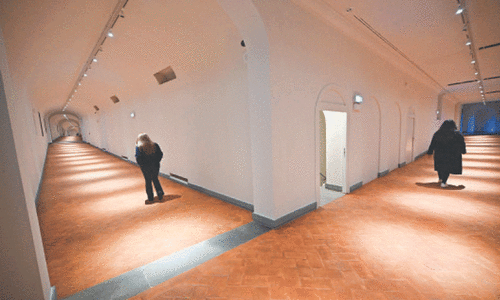KATHMANDU: Washington’s offer to resettle most of the 106,000 Bhutanese refugees who have stagnated in camps in Nepal for 16 years has provoked a whirlwind of reaction that could finally sweep away official inertia toward their plight.
This is “an opportunity for the refugees who had been living a sub-human life for the last 16 years”, US Ambassador to Nepal James Moriarty said on a visit to one of the seven camps in south-eastern Nepal in November. He reaffirmed the position set out by Assistant Secretary of State for Refugee Affairs Ellen Sauerbrey on October 2 – the offer to take in up to 60,000 refugees is a humanitarian one and not meant to absolve Bhutan for evicting the ethnic Nepalis, known as Lhotsampas.
But that will be the result, exiled leaders of opposition Bhutanese political parties and human rights groups have argued. The US “on one hand is aware that (Bhutan’s government) is a terrorist regime,” says prominent Nepal-based leader Tek Nath Rizal. “But instead of pressuring Bhutan through (South Asia’s superpower) India, they say ‘we want to take you to America’...Knowingly or unknowingly the US is helping the terrorist government in Bhutan”, he added in an interview with IPS.
Some of the extremely influential exiled leaders have damned the US proposal outright. Others like Rizal say they will accept “third-country resettlement” only as a last resort. First priority must be given to “repatriation” to Bhutan followed by settlement in Nepal or India, where another 15,000-20,000 refugees live.
But in the tidy camps with their dirt roads and long lines of tiny bamboo huts, it is hard to find anyone in favour of going to the US or to the other countries that have reportedly also offered safe haven – Canada, New Zealand and Australia. “It’s better to go back to Bhutan than to stay here,” says one former farmer, 78, in Sanischare, the western-most camp, home to 21,000 people. “If I can’t go to Bhutan I leave it up to the agencies (that support the camps) to decide,” adds the man.
As he talks to visiting journalists, other residents – men, women and children – crowd around. Most identify themselves as the old man’s relatives; all of them say they want to return to their homeland, even those hardly old enough to remember it.
Local media has reported that some refugees who publicly welcomed the resettlement offer have been threatened, and leaders of the camp management committees who backed the idea were “fired” by the exiled leaders. But later, as the reporters walk through the dusty camp, a United Nations employee suggests that if given the chance to vote confidentially, about 70 per cent of residents would choose third-country resettlement.
In an interview in Kathmandu, human rights activist Gopal Siwakoti agrees that 70 per cent is a good estimate. A supporter of a “comprehensive solution” to the refugee problem, Siwakoti has joined hands with activists in India and Bhutan to press the three governments to focus on the humanitarian issue and resolve the stalemate – Nepal and Bhutan have held 15 rounds of talks and failed, while India has refused to participate.
Bhutan and Nepal do not share a border. They are separated by Sikkim, a former independent state that is now part of India. When Bhutan’s royal government expelled the Lhotsampas in 1990, the refugees first entered India before most returned to Nepal, their ancestral home.
In the 1980s, the northern-based Drukpa elite (ethnic Tibetans) who rule Bhutan as an autocracy accused the Lhotsampas of anti-nationalist activities and began to impose strict conditions. They changed citizenship rules, forced ethnic Nepalis to wear Drukpa dress, to speak their language (Dzongkha) and to stop practising Hinduism; eventually they were chased across the border.
The international community failed to address the issue, Siwakoti told IPS. “It has a moral obligation, but India has an official obligation, for two reasons: it has security and external affairs treaties with Bhutan, and because the refugees transited through India.”
According to Rizal, a former senior civil servant in Bhutan who was jailed for 10 years, “Unless India gets involved in the talks, nothing will happen...Nepal should initiate India’s involvement in the talks.”
But while the South Asian giant’s media, civil society and some politicians are starting to show interest, the government position has not changed. “India encourages the governments of Nepal and Bhutan to find the solution of the problem on their own,” Indian Foreign Secretary Shiv Shankar Menon said on a visit to Kathmandu on November 30.
Still, momentum seems to be growing toward a fundamental step that could break the deadlock – refugee leaders and their backers accepting to detach repatriation from the resettlement option.
Siwakoti describes it as adopting a “multi-track approach”: untie the human rights and humanitarian issues and pursue all options simultaneously instead of waiting for repatriation. “You can’t make this whole population responsible for restoring democracy in Bhutan: they are refugees,” he said.
But, added the activist, the refugees must be declared Bhutanese citizens before being resettled, so they can retain the option to return to the country.
The head of the UN Refugee Agency (UNHCR) in Nepal, Abraham Abraham, has a similar view. “The key (to an agreement) lies in understanding that you can’t keep human beings in a camp situation for 16 years. In my opinion, the humanitarian considerations should prevail over political ones.”
A first step is to “de-link” the options, added the UNHCR chief in an interview. “As things stand, it appears as if repatriation is holding hostage the other two possible solutions...You don’t need to keep all the 100,000 people for the next 10 years (until repatriation is settled). You already have prospects for at least reducing the numbers in the camps now.”
—Dawn/The IPS News Service















































Dear visitor, the comments section is undergoing an overhaul and will return soon.